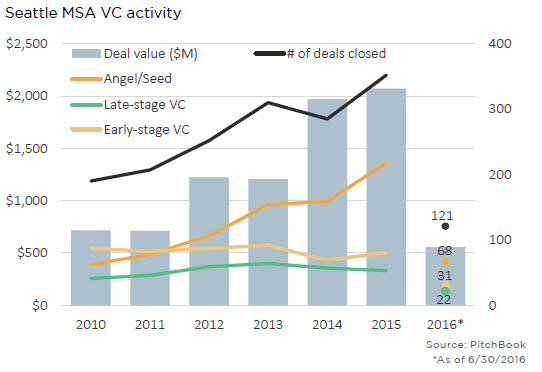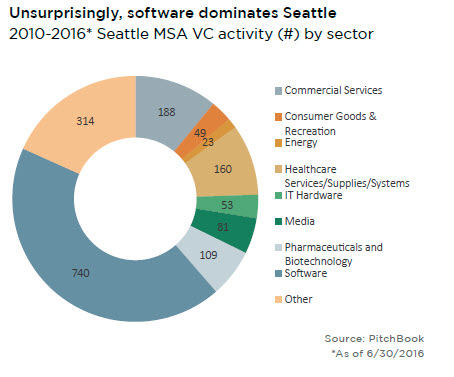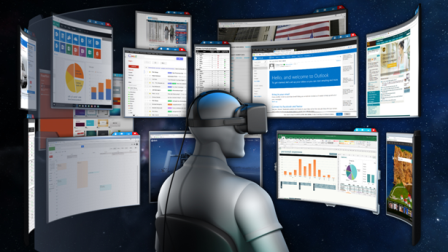Seattle Week in Review: Up in the Sky, It’s Prime Air and Blue Angels

The U.S. Navy’s Blue Angels—and Amazon Prime Air—are rumbling the (currently) blue Seattle skies and the Thunder Boats are ready to rip around Lake Washington. It’s Seafair Weekend, Seattle’s annual celebration of speed and noise. Meanwhile, in this edition of Xconomy Seattle’s Week in Review, we’re reading a new report on U.S. venture investing trends over the last six years, which ranks Seattle as the sixth largest VC ecosystem in the country; following fresh funding for Glowforge and a healthcare technology startup called 98point6; and checking out Envelop VR’s beta launch. Also, Seattle is a top place to spot rare Pokémon. City boosters, make a note of it.
—Since 2010, West Coast tech hubs have seen more than half of the $ 346.5 billion of total U.S. venture capital investment in that time, according to a new report from Seattle-based PitchBook. That’s not especially surprising, given that the West Coast includes Silicon Valley, the center of the VC and tech universe. Indeed, companies based in the metropolitan statistical areas including San Francisco, Oakland, Fremont, San Jose, Sunnyvale, and Santa Clara received $ 144.7 billion during the last six years, or about 42 percent of the U.S. total.
The report, which looks at activity through June 30 of this year, ranks the Seattle MSA, which includes Tacoma, Bellevue, and other burgs in the Puget Sound region, as the sixth largest VC ecosystem in the country. Since 2010, VCs have done some 1,717 deals, investing $ 8.5 billion, or about 2.5 percent of the U.S. total, as calculated by PitchBook. About a quarter of Seattle’s six-year total, $ 2.1 billion, was invested in 2015 across 352 deals. PitchBook’s numbers suggest this may have been a high-water mark: “[F]irst venture financings are on pace to hit just 47 percent of last year’s volume, signaling that innovation in the VC ecosystem may be stalling,” the company says. “Exit activity is also stagnating. 2015 saw a 28 percent dip in terms of the number of exits and a 71 percent drop in terms of total exit value.”
PitchBook’s Seattle MSA snapshot lists zero unicorns—private companies with billion-dollar-plus valuations. (That was before this week’s report in the Wall Street Journal that OfferUp is raising $ 120 million in additional funding at a $ 1.2 billion valuation.)
—While software has been and remains the hottest sector in Seattle for startups, there were a significant number of investments made in healthcare services, suppliers, and systems companies. The healthcare IT industry here saw another new investment this week with an $ 11 million funding round for 98point6, disclosed in an SEC filing. The company, founded in 2015 under the name Rafa Inc., is saying very little about its aims. But there are clues in its job listings. One states, “Our goal is simple—we’re seeking to revolutionize primary care by applying leading-edge data science to greatly reduce its cost. … As one of our physicians, you will deliver direct patient care through technology.” In addition to physicians, the company is hiring a squad of software engineers.
The team behind 98point6 includes co-founder and CEO Robbie Cape, whose last startup, Cozi, a family organization service, was acquired by Time Inc., in 2014, and prior to that worked at Microsoft for 12 years. The company also lists an impressive medical advisory board, drawn from top institutions around the country.
Seattle has a strong case to make as a hub for re-inventing the primary care model, particularly through the application of big data and machine learning. The University of Washington School of Medicine is perennially ranked as the top educator of primary care physicians. It recently launched an effort to drive innovation in the delivery of primary care. In 2015, UW Medicine, the UW’s healthcare system, began using another Seattle-area company, Carena, to provide online virtual clinic visits.
—Seattle startup Glowforge raised $ 22 million from Foundry Group and True Ventures to add staff and inventory beyond the thousands of laser cutters and engravers it’s already manufacturing for thousands of people who pre-ordered one last fall.
Apparently Foundry Group, the Colorado-based VC firm co-founded by Brad Feld, has got the laser bug this week. “We just led a $ 35 million financing at Formlabs. In case you were wondering, lasers are super cool,” Feld wrote in a blog post on the investment in the Somerville, MA-based desktop 3D printing company. Xconomy covered it here.
—Envelop VR, the Bellevue, WA-based startup making software to bring the Windows computing environment into virtual reality, is launching its public beta product today. The software, which creates a customizable, immersive computing environment—think of a virtual office on a mountaintop or in a penthouse, with screens surrounding the user—works with the HTC Vive and Oculus Rift headsets. The company says it enables all Windows applications to work in VR. It’s also working on a software development kit to allow legacy apps to be presented in VR environments. Here’s a story I wrote last year after trying out an early version. The beta is free to download from Steam.
—Bellevue College is turning over part of its computer programming curriculum to Coding Dojo. The deal is a way for the coding school to expand its offerings, and allows the college in Bellevue, WA, to keep its programming courses up to date. Lots more details in this story from Xconomy’s Bernadette Tansey.
—Matt Oppenheimer, CEO of Seattle-based mobile remittances company Remitly, said Donald Trump’s proposal to compel Mexico to pay for a border wall by cutting off wire-transfers by people who couldn’t prove their lawful residency in the U.S. “is preposterous, impractical, and would have detrimental effects on the United States economies and those in the receiving countries.” Oppenheimer, who made those comments in an e-mail to Xconomy, also spoke at an event unveiling a new report (PDF) on the impact of immigrants on Washington’s economy.
—A new aerial entry in this year’s Seafair is one of Amazon’s “Prime Air” cargo jets. As The Seattle Times’ Dominic Gates reports, the Boeing 767-300, part of the fleet of 11 used freight planes the e-commerce giant is leasing, will fly just before the Blue Angels on Friday, Saturday, and Sunday.
—Come catch your rare Pokémon in Seattle. Budget travel site Wanderu says Seattle trails only Los Angeles among U.S. cities with the most sightings of the rarest Pokémon. SayWA? That should really be a highlight of the next Metronatural Seattle tourism marketing campaign. (Apologies for this romp through circa-2006 promotional slogans. #neverforget)
Wanderu’s methodology involved reviewing “photos and videos from 250 cities in the U.S. to find the home of epic, mythical and special Pokémon. We used the Twitter API to count the total number of sightings and look at the diversity of species found in each city.”
(63)
















